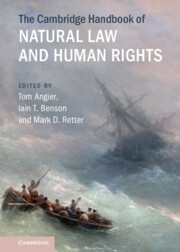Book contents
- The Cambridge Handbook of Natural Law and Human Rights
- The Cambridge Handbook of Natural Law and Human Rights
- Copyright page
- Contents
- Contributors
- Acknowledgements
- Introduction
- Part I Natural Law and the Origins of Human Rights
- Part II Natural Law Foundations of Human Rights Obligations
- 8 Ontological and Epistemological Foundations of Human Rights
- 9 The Teleological Foundations of Human Rights
- 10 New Natural Law Foundations of Human Rights
- 11 A Personalist Foundation for Natural Law and Human Rights
- 12 Acknowledged Dependence, Natural Right, and Human Rights
- 13 Eternal Law, Natural Law, Natural Rights
- Part III Natural Law and Human Rights within Religious Traditions
- Part IV The Human Person, Political Community, and Rule of Law
- Part V Rival Interpretations and Interpretive Principles
- Part VI Challenges and Future Prospects
- Index
8 - Ontological and Epistemological Foundations of Human Rights
from Part II - Natural Law Foundations of Human Rights Obligations
Published online by Cambridge University Press: 03 November 2022
- The Cambridge Handbook of Natural Law and Human Rights
- The Cambridge Handbook of Natural Law and Human Rights
- Copyright page
- Contents
- Contributors
- Acknowledgements
- Introduction
- Part I Natural Law and the Origins of Human Rights
- Part II Natural Law Foundations of Human Rights Obligations
- 8 Ontological and Epistemological Foundations of Human Rights
- 9 The Teleological Foundations of Human Rights
- 10 New Natural Law Foundations of Human Rights
- 11 A Personalist Foundation for Natural Law and Human Rights
- 12 Acknowledged Dependence, Natural Right, and Human Rights
- 13 Eternal Law, Natural Law, Natural Rights
- Part III Natural Law and Human Rights within Religious Traditions
- Part IV The Human Person, Political Community, and Rule of Law
- Part V Rival Interpretations and Interpretive Principles
- Part VI Challenges and Future Prospects
- Index
Summary
This chapter focuses on Maritain’s analysis of the ontological and epistemological foundations of human rights, and his wider hope for ‘practical agreement’ on the content of those rights. On the ontological front, I argue that such agreement is not forthcoming on the basis of natural teleology or eternal law. Neither of these secures assent across the world’s major religious or philosophical traditions. On the epistemological front, neither rationalism nor naturalism holds great promise. While Maritain upholds the naturalist alternative, his efforts devolve into a performative contradiction. For he hopes to rest agreement about human rights on ‘natural inclinations’, which, at the same time, he confines to the realm of the non-conceptual, non-rational and pre-conscious. This constitutes a markedly weak, even incoherent basis for agreement. The stage is set, therefore, for ‘new’ natural law theory, which proposes a non-ontological, purely rationalist foundation. I conclude that this too is an unpromising basis for agreement on rights. Instead, we need a new approach, one that privileges the deliverances of the social sciences and does not strive for universal consensus.
Keywords
- Type
- Chapter
- Information
- The Cambridge Handbook of Natural Law and Human Rights , pp. 119 - 132Publisher: Cambridge University PressPrint publication year: 2022

